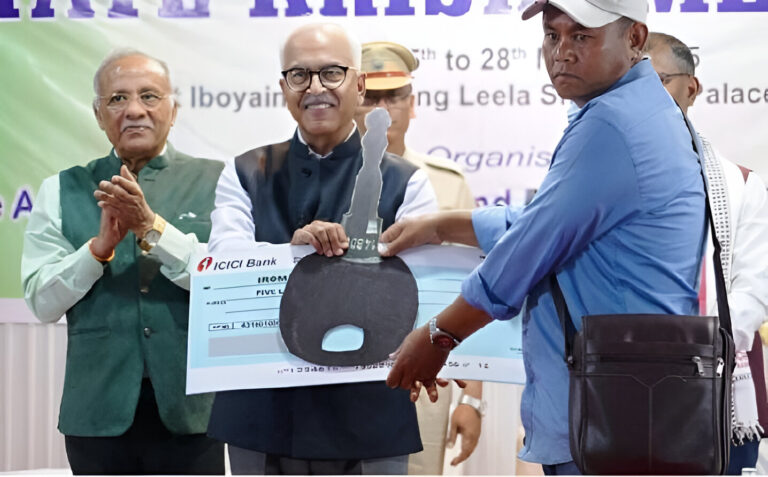Kuki Village Chief Refutes Assault Allegations Over Land Dispute in Manipur
Summary of the News Article
A Kuki village chief in Manipur has dismissed as “baseless” the allegations made by a woman claiming she was assaulted by Kuki villagers during a land dispute. The woman alleged that she was attacked when attempting to construct a house on her land, but the village chief contends that these claims are unfounded and have unnecessarily inflamed communal tensions.
Unpacking the Land Dispute Allegations in Manipur: A Comprehensive Analysis
Introduction: The Heart of the Controversy
Land disputes can be as intricate as a spider’s web, entangling communities in conflicts that are hard to unravel. In Manipur, a recent incident has spotlighted the delicate balance between the Kuki and Naga communities. A woman has accused Kuki villagers of assault over a land disagreement, a claim that the local Kuki village chief vehemently denies. Let’s delve into the layers of this controversy to understand the perspectives, the stakes, and the broader implications.
The Allegation: A Woman’s Claim of Assault
The Incident as Reported
Imagine returning to your ancestral land with plans to build a home, only to face resistance. This is the scenario presented by a woman who alleges that upon attempting to construct a house in her village, she was confronted and assaulted by a group of Kuki villagers. She describes being physically attacked by 10-20 individuals who opposed her building efforts.
The Woman’s Perspective
From her viewpoint, this wasn’t just a personal attack but a challenge to her rightful claim over the land. Such an experience can be deeply traumatic, intertwining personal grief with a sense of injustice. It’s akin to having the ground pulled from beneath your feet, leaving one questioning their place in their own homeland.
The Rebuttal: Kuki Village Chief’s Denial
Dismissing the Allegations
On the flip side, the Kuki village chief has labeled these allegations as “baseless.” He argues that no such assault took place and suggests that the claims are designed to provoke unnecessary tensions between the communities.
Concerns Over Escalating Tensions
The chief’s primary concern revolves around the potential for these allegations to ignite communal discord. In regions where communities coexist in a delicate balance, such accusations can act like sparks in a tinderbox, threatening to disrupt harmony and peace.
Historical Context: Kuki and Naga Relations
A Complex Interplay
The relationship between the Kuki and Naga communities in Manipur is layered with history, shared experiences, and occasional conflicts. Land, being a finite and valuable resource, often sits at the center of these disputes, symbolizing both heritage and survival.
Previous Incidents
This isn’t the first time tensions have flared between these groups. Past incidents have seen allegations of assaults, land encroachments, and other conflicts, each adding a layer of complexity to their relationship. For instance, there have been reports of Kuki miscreants allegedly assaulting Naga individuals in Zeliangrong Naga villages, leading to calls for intervention from civil society organizations.
The Role of Civil Society and Authorities
Calls for Intervention
In the wake of such allegations, civil society organizations (CSOs) often step in, advocating for justice, peace, and dialogue. In this case, Naga village authorities have issued warnings, and women’s unions have condemned the alleged assault, imposing bandhs (general strikes) to protest the incident.
The Importance of Neutral Mediation
Neutral parties play a crucial role in mediating disputes, ensuring that resolutions are fair and that communal harmony is maintained. Their involvement can prevent the escalation of conflicts and promote understanding between differing perspectives.
Media’s Role in Shaping Perceptions
Reporting with Responsibility
The media wields significant influence in framing such incidents. Responsible journalism requires presenting facts without bias, avoiding sensationalism, and being mindful of the potential impact on communal relations.
The Impact of Sensationalism
Sensationalist reporting can exacerbate tensions, leading to misunderstandings and fueling conflicts. It’s essential for media outlets to prioritize accuracy and context, especially in sensitive situations involving communal dynamics.
Broader Implications: Land Rights and Community Relations
The Significance of Land in Manipur
Land in Manipur isn’t merely property; it’s a testament to identity, heritage, and survival. Disputes over land can thus evoke strong emotions, as they touch upon the very essence of community belonging and history.
Navigating Inter-Community Relations
Incidents like these underscore the importance of dialogue, mutual respect, and understanding between communities. Building bridges through communication can prevent misunderstandings and foster a more harmonious coexistence.
Conclusion: Seeking Truth and Promoting Harmony
In the labyrinth of allegations and denials, the pursuit of truth becomes paramount. It’s essential for all parties involved to approach the situation with empathy, seeking resolutions that honor justice and promote peace. After all, in the tapestry of Manipur’s diverse communities, harmony is the thread that holds it together.
FAQs
- How has the Kuki village chief responded to these allegations?
The Kuki village chief has dismissed the allegations as baseless, expressing concerns that such claims could unnecessarily inflame communal tensions. - What is the historical context of Kuki and Naga relations in Manipur?
The Kuki and Naga communities have a complex history in Manipur, with instances of cooperation and conflict, often centered around land disputes and cultural differences. - How are civil society organizations reacting to this incident?
Various civil society organizations have condemned the alleged assault, calling for interventions and, in some cases, organizing protests to demand justice. - What steps can be taken to prevent such disputes in the future?
Promoting open dialogue, ensuring fair legal processes, and fostering mutual respect between communities can help in preventing such disputes and maintaining harmony.

